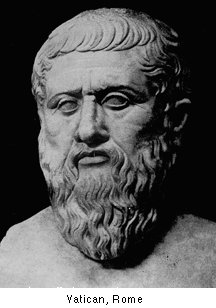Plato
Philospher and scientist, founder of the Academy of Athens; b. 428/427 BC (Athens, Aegina?, Greece), d. 348/347 BC (Athens)
 Plato's parents Ariston and Perictione were both from leading families of Athens; his mother's brother and cousin were engaged in politics. Given that background, Plato probably entertained the idea to enter politics, too; but the violence and disorder of contemporary politics convinced him that politics is not an occupation for a man of conscience.
Plato's parents Ariston and Perictione were both from leading families of Athens; his mother's brother and cousin were engaged in politics. Given that background, Plato probably entertained the idea to enter politics, too; but the violence and disorder of contemporary politics convinced him that politics is not an occupation for a man of conscience.
Plato had learned to follow his conscience from Socrates, and when Socrates was condemned to death in 399 BC he and other followers of Socrates withdrew from Athens to Megara. Plato then went on extensive travels through Greece, Egypt and Italy, ending up in the household of the ruler of Syracuse in Sicily.
In about 387 BC Plato was back in Athens and founded his Academy, an institute for the pursuit of philosophy and science. He spent the rest of his life as its president and main instructor. Activities of the Academy ranged from philosophy to all known branches of science: Members of the Academy excelled in mathematics, geometry, biology, natural history and rhetoric.
Plato considered the exchange of argument and counter-argument in live discussion superior to the written word, but he did write some 36 philosophical works. All are composed in the form of dialogues between persons who existed at the time. Socrates is a prominent participant in most dialogues. It is not clear whether the views expressed by the participants are the views they actually held, or whether Plato uses them as spokespersons for positions taken up to develop the argument.
In his earlier dialogues Plato displays Socrates' method of dismantling beliefs: An initial problem, such as "What is the definition of virtue?", is formulated. Various participants volunteer to answer it, and the answers are shown to contain unsurmountable flaws. The effect of the dialogues is to make the readers aware of their ignorance of the most basic and most important things that people should know.
Plato's later dialogues develop his system of ideas, already found in his earlier works, further. Plato states that the world of physical things is an imperfect rendition of pure "Forms", such as the Form of stone, of wood, colour, beauty or justice. He describes learning as a form of remembering, which is possible because the human soul is eternal, ie existed before it joined a physical body. Philosophers have an understanding of the world of Forms; in Plato's view they are therefore the best persons to lead society.
Plato's Academy did not restrict itself to these teachings but took an active role in consultancies of various kinds. Several of its members were involved in the formulation of laws for various city-states.
The Academy, regarded by some as the first university of the European world, continued after Plato's death for more than 800 years. (It was closed as a pagan institution by Justinian in 529 AD.) Plato's influence did not end when his Academy closed. Together with his spiritual teacher Socrates and his most gifted student Aristotle, Plato is one of the founding fathers of European philosophy and thought. He influenced Christian thinkers and moral theorists for centuries.
home
 Plato's parents Ariston and Perictione were both from leading families of Athens; his mother's brother and cousin were engaged in politics. Given that background, Plato probably entertained the idea to enter politics, too; but the violence and disorder of contemporary politics convinced him that politics is not an occupation for a man of conscience.
Plato's parents Ariston and Perictione were both from leading families of Athens; his mother's brother and cousin were engaged in politics. Given that background, Plato probably entertained the idea to enter politics, too; but the violence and disorder of contemporary politics convinced him that politics is not an occupation for a man of conscience.